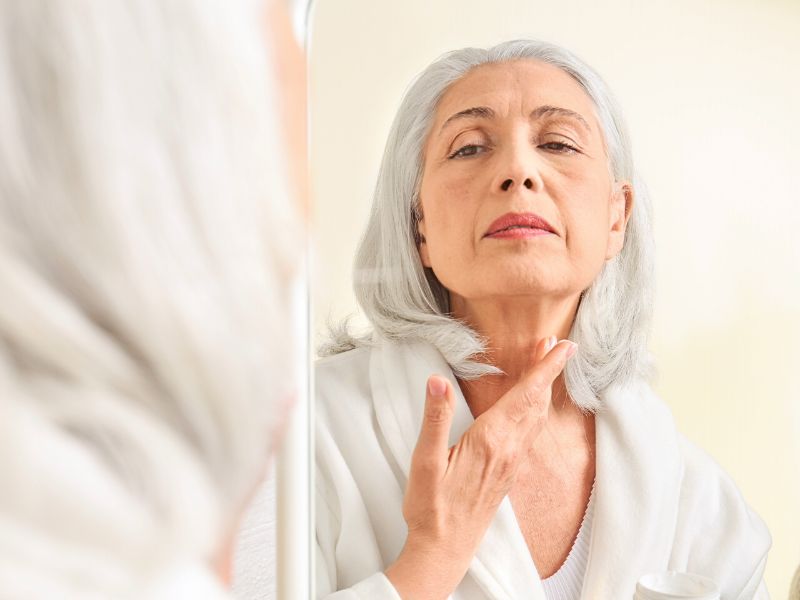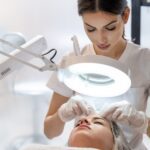
Human as we are, as the years pass by, we tend to witness noticeable changes in our skin. As we age, our skin naturally changes, showing different signs that affect how it looks and feels. This transformation is a result of several factors, both internal and external, that gradually influence the condition of our skin.
One of the primary reasons behind these changes is the decline in essential proteins like collagen and elastin. Moreover, aging skin tends to produce fewer natural oils and moisture. External factors also contribute significantly to the aging process of our skin, like sun exposure, environmental elements, and unhealthy lifestyles.
Understanding these fundamental changes that occur in our skin as we age provides insight into the reasons behind the visible signs of aging, such as sagging, wrinkles, dryness, and age spots. Exploring effective solutions and treatments to address these concerns becomes essential in managing and caring for aging skin.
Unveiling the Reasons Behind Common Problems of Aging Skin

The way our skin ages is affected by both things that happen within our bodies and things from the outside. These factors together change how the skin looks and works. Here are the primary reasons behind the most prevalent skin issues experienced as we age:
- Loss of Skin’s Collagen and Elastin Support: Maintaining the firmness and flexibility of our skin relies a lot on collagen and elastin. But as we age, our bodies make less of these proteins. This drop in production leads to our skin losing its tightness and beginning to sag.
- Reduced Hydration and Natural Oils: Aging skin tends to produce less natural oils and moisture, causing dryness, flakiness, and a dull complexion.
- UV Damage and Photoaging: Prolonged exposure to the sun’s harmful UV rays without proper protection accelerates skin aging. UV rays cause collagen and elastin fibers to weaken, resulting in the development of wrinkles and age spots.
- Free Radical Damage: Environmental elements such as pollution and an unhealthy lifestyle, including smoking and poor dietary choices, contribute to the production of free radicals. These unstable molecules damage skin cells, accelerate aging, and lead to oxidative stress.
Understanding these underlying factors is pivotal in exploring effective solutions and treatments to address aging skin concerns.
Effective Tips and Treatments for Aging Skin

Numerous methods and skincare techniques exist to handle and reduce the noticeable signs of aging on your skin. Adopting these suggestions and treatments into your daily regimen can greatly assist in preserving vibrant and healthy-looking skin.
- Healthy Lifestyle Habits: Consistently exercising helps improve blood flow, ensuring that essential nutrients reach and nourish the skin. A balanced diet comprising fruits, vegetables, whole grains, and healthy fats nourishes the skin from within. Ensuring you drink sufficient water maintains your skin’s moisture and supports its natural functions.
- Sun Protection: Sunscreen application is crucial year-round, even on cloudy days. Choose sunscreen that covers a wide range of rays, shielding against both UVA and UVB. Wearing hats, sunglasses, and seeking shade during peak sunlight hours further shields the skin from harmful UV exposure.
- Topical Treatments: Retinoids, which come from vitamin A, are great for lessening fine lines and wrinkles by helping your skin make more collagen. Hyaluronic acid, known for its hydration properties, helps plump the skin. Vitamin C acts as an antioxidant, brightening the skin and reducing discoloration. Peptides aid in firming and rejuvenating the skin.
- Professional Treatments: Dermatological procedures like chemical peels exfoliate the skin’s surface, revealing smoother, younger-looking skin. Microdermabrasion involves gentle exfoliation to improve skin texture. Laser therapy targets specific skin concerns like pigmentation and stimulates collagen production. Scarlet RF, a radiofrequency treatment, promotes collagen synthesis and skin tightening, reducing the visible signs of aging.
Conclusion
Understanding why skin ages helps people make smart choices for taking care of their skin. Many factors, both from within our bodies and from the environment, affect how our skin ages. These factors include things like losing collagen and damage from the sun. Taking care of your skin means considering all these factors and using a variety of methods to keep it healthy.
A good starting point for healthy skin is adopting good habits like exercising regularly, eating a balanced diet, drinking enough water, and protecting your skin from the sun. These habits form the basis of good skincare. On top of that, using creams or treatments with helpful ingredients and getting professional help from dermatologists can also help fight signs of aging.
One of these treatments, called Scarlet RF, stands out because it uses advanced radiofrequency technology. Scarlet RF works by sending heat into specific layers of the skin using tiny needles, which helps the skin make more collagen and improves its texture. This treatment, along with others provided by dermatologists, offers a way for people to improve their skin as they age.
By combining healthy lifestyle habits with treatments like Scarlet RF, people can take care of their skin better and feel more confident as they age. This approach helps maintain healthy and glowing skin at any age.


